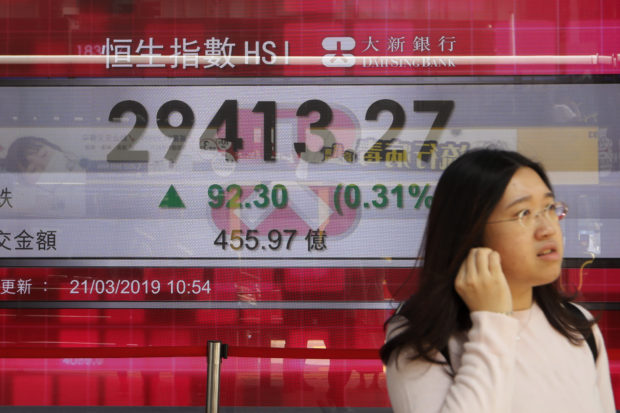
A woman walks past an electronic board showing Hong Kong share index outside a bank in Hong Kong, Thursday, March 21, 2019. Shares in Asia are mostly higher after the Federal Reserve said it has ruled out interest rate increases for this year. (AP Photo/Kin Cheung)
BANGKOK – Shares advanced across Asia on Thursday after the Federal Reserve said it has ruled out interest rate increases for this year.
The Shanghai Composite index rose 0.9 percent to 3,119.72 while Hong Kong’s Hang Seng gained 0.2 percent to 29,371.12.
South Korea’s Kospi climbed 0.5 percent to 2,187.71, while Australia’s S&P ASX was flat at 6,167.20.
Shares were higher in Taiwan and Southeast Asia.
Markets in Japan and India were closed for national holidays.
U.S. equities fell Wednesday, led by banks, after the central bank said it expects no interest rate increases this year and issued a dimmer outlook on the U.S. economy.
The S&P 500 dropped 0.3 percent to 2,824.23. The Dow Jones Industrial Average lost 0.5 percent to 25,745.67, while the Nasdaq composite eked out a slight gain, adding 0.1 percent to 7,728.97. The Russell 2000 index of smaller-company stocks gave up 0.8 percent to 1,543.16.
The real action centered in the bond market, where prices rose sharply, pulling the 10-year Treasury yield as low as 2.52 percent, the lowest level in more than a year. That was down from 2.61 percent late Tuesday and from 3.20 percent late last year.
The two-year Treasury yield, which is more influenced by Fed movements, fell to 2.39 percent from 2.45 percent late Tuesday.
Yields have been falling steadily since November, as worries rose about a slowing global economy and traders subsequently made moves in anticipation of a more patient Fed.
The Fed’s decision to put rate increases on hold is a marked change from three months ago, when the central bank projected two rate hikes in 2019.
The move comes as Fed officials project that the U.S. economy will grow more slowly this year and in 2020, a change from the panel’s projections just three months ago.
“There is clear evidence the Fed are trying to get in front of the economic story and boost inflation expectations,” Chris Weston of IG said in a commentary.
It hit the dollar, which dropped to 110.52 Japanese yen from 110.70 yen on Wednesday. It had been hovering above 111 yen. The euro climbed to $1.1424 from $1.1414.
News of tighter supplies of oil and continued production cuts helped to push the price of benchmark U.S. crude oil above $60 a barrel.
Benchmark U.S. oil was flat at $60.23 per barrel in electronic trading on the New York Mercantile Exchange. It jumped 94 cents on Wednesday, closing above $60 per barrel for the first time since November.
Brent crude gained 9 cents to $68.59 per barrel.
The rise came after the U.S. government reported that supplies of oil fell 9.6 percent last week. It also followed news that OPEC plans on maintaining deep production cuts.
The price of oil has been increasing sharply since Christmas Eve, when it hit a low of just over $42 per barrel. That followed a 44 percent plunge since October 3, when it hit a high of just over $76 per barrel. /gsg